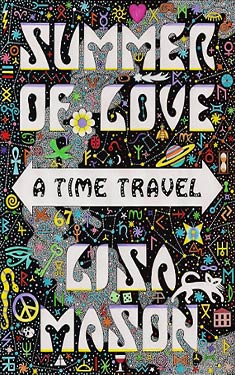Lisa
Mason
Completed
10/5/2013, Reviewed 10/7/2013
5
stars
For
some reason, when somebody tells me, “You have to read this book,” I normally
raise my hackles and resist. I prefer
discovering books on my own, perusing the shelves at the library or bookstore,
or finding a recommendation on a website or NPR. Over time, I’ve learned to keep those hackles
a little lower and be more open to other people’s suggestions, but it still
creates cognitive dissonance in my head.
So when my partner recommended “Summer of Love” by Lisa Mason to fill my
time while waiting for a hold on my next book at the library, I reacted with
outward enthusiasm and my usual internal hesitancy. He’s a good judge of books, and I know that;
I’ve read his recommendations before.
The psychedelic-designed cover of his trade paperback first edition is
in tatters from the numerous rereads, so I know he loves it. I needed another book for my Women of Genre
Fiction challenge anyway. I acceded and took
the book…and loved every word.
Chiron
Cat’s Eye in Draco, a time traveler from the year 2467, comes back to San
Francisco 1967, the Summer of Love, to find a young girl, Susan Stein, aka
Starbrite. His mission is to protect her
so that the timeline leading to his present, his Now, is conserved. Ruby A. Maverick, a metaphysical shop owner
in the Haight district, meets Susan and later Chi, and reluctantly lets them
crash at her place. Together they must
make it through the summer avoiding the craziness of the hippy culture and
demons of an alternative future.
Of
the three major characters, Ruby was my favorite. She starts out as an antagonist to Starbrite
and believes Chi is a narc. Over the
course of the book, she reveals herself to be a wise, critical, and caring voice
without losing the edge which the reader gets to taste at the start of the book. She’s sassy and earthy, not simply the two-dimensional
woo-woo stereotype you would imagine as the owner of a metaphysical store.
The
book is filled with colorful minor characters. As the minor characters are
fleshed out, the reality of the Summer of Love is revealed. It begins with optimism and a sense of wonder
and hope, and the minor characters are fanciful idealistic hippies, much as you’d
expect from the stereotypes of the 60’s.
As the summer progresses, we learn what’s behind these characters, and
the movement, the problems, fear, despair, and seediness.
The
book is masterfully told from the perspective of each of the main
characters. It is divided into sections,
and each section contains three chapters, one for each of the voices. The plot moves linearly through each voice
and chapter, providing the reading with rich character development from a
first-person as well as two third-person perspectives. This structure also gives you three
experiences of the Summer of Love: naïve, outsider, and insider. Together, it works into a seamless, exciting,
and interesting narrative.
What
surprised me most about the book was the hardness of the science fiction. Considering the context, I was expecting a
much softer SF novel. Instead, the
author went into great detail explaining Chi’s world of 2467, the mechanism of
time travel, the gadgets, and the interactions with the alternative
future. At the same time, she examines
in depth the issues of the mid-60’s:
racial tensions, women’s rights, drug culture, and general societal
change. We get to explore a fine blend
of hard and soft through the perspectives of all three characters.
One
interesting point regarding the structure of the novel is that it is told in
present tense. My partner warned me that
it might take a little getting used to. I've struggled with other present tense novels before, namely, “Yiddish
Policeman’s Union.” However, I settled
into it with no problems. The prose is
that good. I’m a slow reader, but I read
this more slowly than usual because every word seemed important and every
sentence necessary for feeling immersed in the story.
This
is a 5 star book. Not only was it
excellent, but it moved me intensely. I
felt connections with the characters. I
wanted to be a runaway in 1967. I wanted
to own a metaphysical store in a town of hippies.
I wanted to stand hand-in-hand at the edge of existence and since songs
from Sgt. Pepper. I did not want it to
end.

No comments:
Post a Comment